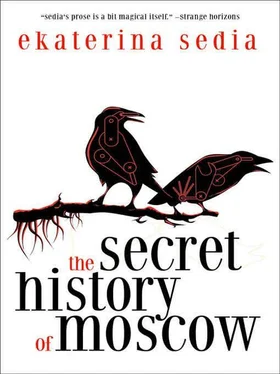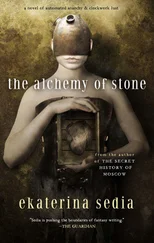Frowning, Yakov walked up the flight of stairs and into the office. He settled at his desk, and positioned the crow, whom he had named Carl, in a comfortable nook between the radiator and the window. His desk was in the back, where actual work was taking place and no petitioners were allowed. The front room, bisected by the glass partition with small semicircular windows, was dominated by the passport desk, which was always doing brisk business.
He longed to be at the passport desk-although boring, the work there was familiar, and one could go through the motions of looking up vital statistics and stamping and filling in the blanks while thinking about something else entirely. Other police work suddenly lacked the familiarity.
Their station always used to be a quiet one, and Yakov had resigned himself to going through his life and retiring without ever investigating a homicide, without ever solving anything more serious than a domestic dispute or a drunken confrontation. It suited him fine, and the recent increase in crime, racketeers that came out of the woodwork, the territorial disputes, the murders, the torture-all of it was too much for him.
He shuffled papers in his desk, hoping that he would remain unnoticed, that no one would unload a petitioner on him and make him listen to another bitter tale of misery he could do nothing about. He would give them the usual speech of how they would do everything in their power, not mentioning that it wasn't much, that they lacked funding and morale, and that retirement seemed like a distant paradise to the young among them, and a nearby oasis that would finally quench their thirst to those who were older, but none of them really wanted to be here, and all regretted going into this line of work, except maybe the girls at the passport desk.
He managed to spend the morning pretending to be busy, and surreptitiously feeding the little crow every time he opened the bright glass beads of his eyes, his yellow beak gaping expectantly. Yakov shoved bits of raw hamburger into the hungry mouth, worried that the chunks might be too big. But Carl swallowed, and waited for more. Then Yakov worried about overfeeding.
"Richards,” the voice by his desk said. “I need your attention for a bit."
Yakov looked up to meet a steely gaze of his lieutenant, who despite Yakov's seven-year tenure at the station still had trouble with his last name-he pronounced it carefully, as if the foreign word would burn the roof of his mouth if he weren't vigilant about it. “Just be a moment, Lieutenant Zakharov,” he said.
Zakharov couldn't wait, of course. He ushered in an older woman, an obvious provincial covered with headscarf and shod in the gleaming hooves of orthopedic shoes. She had been crying, but her mouth formed a tight pucker, to ward against any impending emotion. Yakov knew that look well.
He sat the woman in front of his desk, and shoved Carl out of the way. She studied the chipped composite wood and a stack of papers Yakov kept there just to appear busy. The woman then turned her suspicious attention to Yakov. Her furrowed face betrayed her thoughts-she considered Yakov too young, too uneducated, not someone who should be in position of authority, making decisions that people's lives depended upon.
"What can I do for you?” Yakov said, derailing the unpleasant train of thought.
Carl squawked, and the woman frowned. “My name is Anna Chernina. My son-in-law is missing. He went to buy cigarettes and never came back. My daughter's been crying for two days straight now."
Yakov wrote down the address of the woman and her daughter, and the description of her son-in-law-eyes: brown, hair: brown, beard: none, height: 1 m 81 cm. He promised to call as soon as they heard anything.
The woman left unconvinced that Yakov was going to help her. He was pretty sure that he wasn't.
When lunchtime rolled around, Zakharov reappeared and straddled the peeling vinyl-upholstered chair in front of Yakov's desk.
"Yasha,” he said, more familiar than Yakov ever remembered him, “we have five disappearances reported today."
Man. Wings. Scottish terrier abandoned in the empty field. Yakov banished the thought. “Racketeers,” he said.
"It's happening all over Moscow. Thirty people in the last week."
"Racketeers are all over Moscow."
Zakharov rested his aristocratic skull on his hands folded over the back of the chair, his gaze traveling up the freshly whitewashed walls and to the ceiling blinking with naked bulbs. He sighed. “I suppose. God, why me?"
Yakov shrugged and reached for the bag with his little crow.
"Neat,” Zakharov said. “Where'd you get it?"
"He fell out of the nest Saturday,” Yakov replied. “It was windy.” And there was no man turning into a bird.
"I can keep an eye on him,” Zakharov said.
"Oh? And I will be doing what exactly?"
"You'll be visiting the families of the missing persons and finding out whether they were involved in any sort of commerce."
"Who isn't nowadays?"
"My point exactly. See who they worked for, see if any Chechen gangs were involved."
Yakov looked up. “Chechen?"
"Yeah. Armenian, Georgian-whatever. Caucasian nationals."
"Most thugs I see are Russians,” Yakov said.
The lieutenant frowned and tossed a notepad with names and addresses at Yakov. “Go see to it."
Yakov went.
* * * *
He couldn't understand why his mother had decided to move to this city. Sure, the center, the old city, was beautiful. But they lived in the suburbs, which were dreadful and empty and grey, all natural vegetation twisted and starved by overturned dirt, by too many people, by the incessant burrowing of new construction. One couldn't cross a yard without accumulating great clods of clay on one's boots, and their weight inevitably dragged down the spirit. By the time Yakov reached the well-paved streets and the bus stop, he would usually lose the desire to live anywhere, let alone this place. The anorexic poplars bent in the persistent wind given free rein in this neighborhood, rarely more than corridors between tall flat buildings that begat drafts and winds; Yakov hoped that one day the confluence of air streams and accumulated depression in the air would create a tornado. He pictured it in his mind, a perfect whirlwind picking up the discarded garbage, the construction bricks carelessly left in sloppy piles, cars parked by and occasionally on the sidewalks. Just clearing out all the trash which hard life had deposited here and forgotten about. He went back and forth on whether he wanted the people gone as well.
His first visit took him into the heart of this desolate labyrinth. He imagined himself a Theseus in a police uniform; only a thread and an Ariadne attached to it were missing. Sweat trickled down his neck and cooled in the hollow between his shoulder blades as he imagined a minotaur waiting for him-a terrible creature brought forth by the upset of the world's order, born from the chaos that ruled the land and the pungent dreams of the new Russians, a misshapen embodiment of lawlessness and despair.
The hoodlums hanging out by the building gave him oblique looks but didn't heckle. He was grateful for that, for being able to go by without being called names. He ducked into the entrance and ran up two flights of stairs to the second floor where his first appointment waited.
He rang the bell and waited. He pushed the door and it swung noiselessly, admitting him into a crammed one-bedroom apartment, where pride masked poverty with knick-knacks and imitation wood furniture. He saw a cockroach, scuttling away shyly, and called into the empty place, “Hello?"
"Over here,” he heard from the kitchen.
A young girl, maybe seventeen, sat at the kitchen table, her hands folded in her lap. Her gaze never met Yakov's, and remained directed toward the single window. “When we first moved here,” she said, “there were apple orchards. This house was the first to be built in this district, and all the rest was just gardens, and the woods past the railroad tracks. There were owls there-I could hear them hooting every night. The trains whistling and the owls hooting, this is how I remember it. Especially in the summer."
Читать дальше












